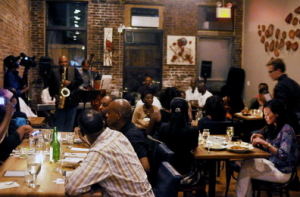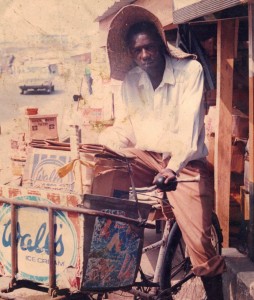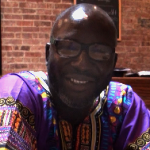This piece was written by Adeola Oladele-Fayehun and originally published on AfricanSpotlight.com, an online magazine celebrating Africans in the diaspora. Oladele-Fayehu’s video and interview with Lookman Afolayan Mashood, a man who was once an ice cream vendor on the streets of Lagos and is now the owner of Buka, a popular Nigerian restaurant in Brooklyn, NY, fits in with Fi2W’s new Food in Two Worlds™ series. Our goal is to make you hungry for the flavors that immigrants from around the world have brought to the US, and for you to gain a deeper understanding of the people who make, grow, sell and consume food in immigrant communities.
Interview with Lookman Afolayan Mashood by Adeola Oladele-Fayehun, founder and editor-in-chief of AfricanSpotlight.com.
Where are you from?
I’m from Ijomu Oro in Kwara State. I’m an Igbomina man, but I lived in Lagos all my life.
What were you doing in Lagos before moving to the United States?
When I was in Lagos, I did many things. But my last job was, I used to sell ice cream. I lived in Isale-Eko, where most of my friends are bankers. When everybody is going to work in the morning, I dress up too very nicely like am going to my father’s shop in Bariga, but instead am going to sell ice cream. When I get there, I change my dress and put this big hat on my face, because I don’t want my friends to see me. But the irony was, I was actually making more money than people who were bankers at that time. When I was able to save enough money, I bought my plane ticket and moved here.
When did you move to the U.S.?
I left Nigeria in 1994, went to Dubai for two years. Then I came here in 1996, so that’s 15 years ago.
What did you do upon getting to America?
I worked in an African retail store making pepper-soup. It’s just a retail store but we sell pepper soup at night. But I was really good at it that, and it became very popular. And I must tell you, that’s where the idea of opening a restaurant first came to me. Once I left the store, I became a carpenter. I went to carpentry school; I was there for 4 years. I’m a union carpenter. And I used to drive a yellow cab.
So, how did Buka start?
It’s funny because what I enjoy most in Nigeria anytime I go, is to go and eat all those street foods – the “Buka.” And it might not look very beautiful or anything, but every Nigerian knows that’s where you get the best food, not in these fancy restaurants. The best food is from those local mamas in one corner of the street, maybe in Tinubu Square or something like that. Sometimes the dirtier they are, the better the food, (laughter). So I really missed going to a Buka.
I’ve taken people to eat in all kinds of restaurants in this city, Mexican, Italian, you name it, but I was always ashamed to take people to Nigerian restaurants because they were not presentable. When the African retail store closed down, I was already well known in Brooklyn for pepper soup. That was when I decided to open my own Buka complete with both good food and the fanciness missing in other Nigerian restaurants. Also, I have a very beautiful girlfriend that joined me and believed in my dream and decided to support me.
Was this location a restaurant before you acquired it?
Actually, this used to be a law firm. It’s been abandoned for like five years when we moved here, so we did construction for eight months before we opened. Like I tell you, my girlfriend is an architect, while am a carpenter. So she drew it, and I built it to precisely what she drew.
On average, how many people come to Buka?
On week days, we serve about 300 meals, but the number doubles on weekends, about 500 people, sometimes we run out of supplies and we have to buy more. What makes me very happy is that, Buka is attracting both Nigerians and non-Nigerians. It’s not just Nigerians that come here, our customers are like 50-50, half Nigerians and some people who have never been to Nigeria are coming just to experience Nigerian food, and they keep coming back.
Apart from the food, what are the events taking place in Buka?
A lot of cultural events, Nigerian fashion shows, art shows, musical performances and all that.
Do you have any message for new Nigerian immigrants?
Yes, and please get this on tape. America is a land of opportunity, and it’s still a land of opportunity up till tomorrow. If you come here determined to work, there is work that you can do. Yeah, it might not be as you expect when you’re leaving Lagos, like ‘oh, I’m gonna get to New York and start packing money,’ it’s gonna be a little difficult. But if you’re ready to work and you follow a strict plan and you’re determined, in this country, if you work, you’re going to make it.
Some in Nigeria think things are very easy here, what do you say?
When you come to this country, you’ve never worked in your life. I don’t care the kind of job you do in Nigeria, the real work is in America. Here, there are people that have two or three jobs. You actually go to work at 9, you come back at 5, then you rest till seven o’clock and go to another job. So don’t think you gonna come here and pick money on the street. Here you’re going to really really really sweat! But if you sweat, there’s a reward for you. It’s not going to be forever, it’s just for some time.
What do you spend your money on?
My family is my number one priority. I have three children, and both of my parents are old, and I’ve promised them not to work for like 8 or 9 years ago that I will take care of them. My father has like 17 or 18 children, (laughter), you know how we are from Nigeria, everybody, we’re from extended family. It gets to a stage, you want to tell people to go and do what they have to do to survive, but at the same time, you have to remember that maybe one time in your life, you were a beneficiary of this culture too. And some of my father’s friends came around and saw the restaurant, they went home and told him – your son is so rich in America! So, now I can’t tell anybody in the family I don’t have money.
How does it feel knowing a lot of Nigerians are proud of what you’ve done here?
It makes me want to do more. And a lot of times, it did not occur to me what I have done or what Buka has actually done, because I’m like always hungry for more. So because of what I worry about, it doesn’t make me appreciate what I have now, which I don’t think is a great attitude. But if you’ve been poor for a long time in your life, I don’t think it’s a bad attitude to have either.
Lookman says he learned how to cook from his brother’s wife when he was in Nigeria. He is planning on starting another business in New York before moving back to Nigeria.
Read more stories about the African diaspora community on AfricanSpotlight.com.







